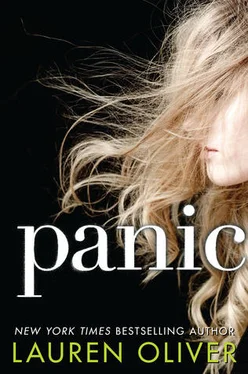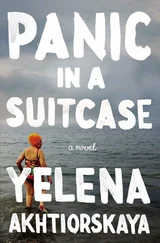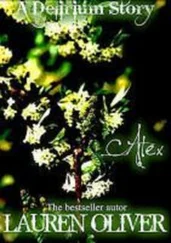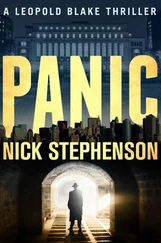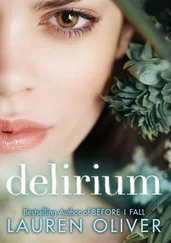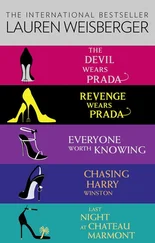To my editor, Rosemary Brosnan.
Thank you for your wisdom, support, and above all, friendship.
I would have given up on this book were it not for your encouragement.
Thank you for helping me become a better writer.
By the time you read this, it will have been almost four years since the publication of my first novel, Before I Fall . A lot has changed for me since 2010. In the past four years, I’ve been blessed with the opportunity to travel the country, speaking with young and avid—even obsessive—readers. I’ve met the teachers and librarians who move the engines of these young minds, or who at least keep them well oiled. I’ve met with booksellers who have soldiered through years of economic uncertainty in order to continue serving their communities; with sixteen-year-old bloggers who function as the twenty-first-century equivalent of the ever-feared and much-revered cultural critic; with fans who have foisted my books on unsuspecting family members and friends. I’ve participated in animated conversations with people halfway around the world about what’s on our TBR piles, and I’ve discovered that reading communities are much the same in the Philippines as in Philadelphia, in London as in London, Ohio.
I’ve been humbled, inspired, and grateful.
I’ve been writing—a lot. After my first novel came the Delirium trilogy and an accompanying collection of novellas, plus two fantasy books for middle-grade readers, Liesl & Po and The Spindlers , the first of which was inspired by a devastating personal experience, the second by a Maurice Sendak book I loved as a child. With Panic —the book you’re holding in your hands, about a small, struggling town and the consequences of a dangerous game the teens play over the summer—I returned to realism. Later this year, I’ll publish my first book with Ecco, an adult division of HarperCollins.
The subjects, protagonists, settings, and even genres of my books are diverse—probably a reflection of the variety of places I’ve been and people I’ve met in the past several years. And yet, in all of my books—including this one, my latest and possibly my favorite—there is a common theme: the desire, the need, to become whole, to be a part of something bigger, to find fulfillment in friendship and in shared community.
So this is simply a letter to all of my readers, past and future, new and old: Thank you for sharing your community with me. Thank you for letting me do what I love. Thank you, above all, for helping me become whole.
With best regards,
Lauren Oliver
heather
THE WATER WAS SO COLD IT TOOK HEATHER’S BREATH away as she fought past the kids crowding the beach and standing in the shallows, waving towels and homemade signs, cheering and calling up to the remaining jumpers.
She took a deep breath and went under. The sound of voices, of shouting and laughter, was immediately muted.
Only one voice stayed with her.
I didn’t mean for it to happen.
Those eyes; the long lashes, the mole under his right eyebrow.
There’s just something about her.
Something about her. Which meant: Nothing about you.
She’d been planning to tell him she loved him tonight.
The cold was thunderous, a buzzing rush through her body. Her denim shorts felt as though they’d been weighted with stones. Fortunately, years of braving the creek and racing the quarry with Bishop had made Heather Nill a strong swimmer.
The water was threaded with bodies, twisting and kicking, splashing, treading water—the jumpers, and the people who had joined their celebratory swim, sloshing into the quarry still clothed, carrying beer cans and joints. She could hear a distant rhythm, a faint drumming, and she let it move her through the water—without thought, without fear.
That’s what Panic was all about: no fear.
She broke the surface for air and saw that she’d already crossed the short stretch of water and reached the opposite shore: an ugly pile of misshapen rocks, slick with black and green moss, piled together like an ancient collection of Legos. Pitted with fissures and crevices, they shouldered up toward the sky, ballooning out over the water.
Thirty-one people had already jumped—all of them Heather’s friends and former classmates. Only a small knot of people remained at the top of the ridge—the jagged, rocky lip of shoreline jutting forty feet into the air on the north side of the quarry, like a massive tooth biting its way out of the ground.
It was too dark to see them. The flashlights and the bonfire only illuminated the shoreline and a few feet of the inky dark water, and the faces of the people who had jumped, still bobbing in the water, triumphant, too happy to feel the cold, taunting the other competitors. The top of the ridge was a shaggy mass of black, where the trees were encroaching on the rock, or the rock was getting slowly pulled into the woods, one or the other.
But Heather knew who they were. All the competitors had to announce themselves once they reached the top of the ridge, and then Diggin Rodgers, this year’s sportscaster, parroted back the names into the megaphone, which he had borrowed from his older brother, a cop.
Three people had yet to jump: Merl Tracey, Derek Klieg, and Natalie Velez. Nat.
Heather’s best friend.
Heather wedged her fingers in a fissure in the rocks and pulled. Earlier, and in years past, she had watched all the other gamers scrabbling up the ridge like giant, waterlogged insects. Every year, people raced to be the first to jump, even though it didn’t earn any extra points. It was a pride thing.
She banged her knee, hard, against a sharp elbow of rock. When she looked down, she could see a bit of dark blood streaking her kneecap. Weirdly, she didn’t feel any pain. And though everyone was still cheering and shouting, it all sounded distant.
Matt’s words drowned out all the voices.
Look, it’s just not working.
There’s something about her.
We can still be friends.
The air was cool. The wind had picked up, singing through the old trees, sending deep groans up from the woods—but she wasn’t cold anymore. Her heart was beating hard in her throat. She found another handhold in the rock, braced her legs on the slick moss, lifted and levered, as she had watched the gamers do, every summer since eighth grade.
Dimly, she was aware of Diggin’s voice, distorted by the megaphone.
“Late in the game . . . a new competitor . . .”
But half his words got whipped away by the wind.
Up, up, up, ignoring the ache in her fingers and legs, trying to stick to the left side of the ridge, where the rocks, driven hard at angles into one another, formed a wide and jutting lip of stone, easy to navigate.
Suddenly a dark shape, a person, rocketed past her. She almost slipped. At the last second, she worked her feet more firmly onto the narrow ledge, dug hard with her fingers to steady herself. A huge cheer went up, and Heather’s first thought was: Natalie .
But then Diggin boomed out, “And he’s in , ladies and gentlemen! Merl Tracey, our thirty-second gamer, is in !”
Almost at the top now. She risked a glance behind her and saw a steep slope of jagged rock, the dark water breaking at the base of the ridge. It suddenly seemed a million miles away.
Her stomach turned, and for a second the fog cleared from her head, the anger and the hurt were blown away, and she wanted to crawl back down the rock, back to the safety of the beach, where Bishop was waiting. They could go to Dot’s for late-night waffles, extra butter, extra whipped cream. They could drive around with all the windows open, listening to the rising hum of the crickets, or sit together on the hood of his car and talk about nothing.
Читать дальше
